Body Recomposition Calculator
Discover the perfect calorie and macro amounts for body recomp with our customizable calculator.
What is body recomposition?
Body recomposition is the process of improving your body composition by increasing muscle mass and decreasing fat simultaneously.
Favorable body composition has many health benefits and improves athletic performance.
There is ample research-backed evidence showing it is entirely achievable. However, it requires a commitment to weight training and a nutrition plan.
How to do a body recomposition
Step 1: Enter your details into the calculator
If you know your body fat percentage (calculate here), choose Lean Mass Formula and input your percentage.
The lean mass method yields better results than weight and height alone.
Step 2: Choose your recomposition goal
- If you choose More Fat Loss, there will be less muscle gain.
- If you choose More Muscle Gain, there will be more muscle gain, but probably some fat gain.
- If you choose Even – it’s a compromise between the two.
Step 3: Take note of your calories and macros
The calculator will recommend your daily calorie and macro amounts. If you’re new to macros, you’ll need to get up to speed.
You will be told how much carb, protein, and fat you must eat daily. You can adjust this to show per meal to help you get an idea.
It’s best to eat more on workout days (the increased carbs fuel your workouts) and less on non-workout days. Protein remains relatively constant throughout – muscle recovery can happen anytime.
Step 4: Stick to a consistent workout routine.
Consistent workouts are not optional for body recomposition.
Your workouts must be resistance-based, not cardio-based. Do weight-bearing exercises rather than running or walking.
As a basis, we recommend this:
- Have three weight training sessions per week.
- Minimum of 30 minutes per session.
- Focus on compound movements.
For example, squats, deadlifts, pull-ups (or lat pull-downs) – rather than bicep curls, etc. - Rest only 30-60 seconds between sets (i.e., leave your phone at home).
- Three sets per exercise, 8-15 reps per set.
Step 5: Track your macros
For the maximum chance of success, you will want to track your macros.
This can be tricky.
If you’ve got the budget, use Factor Meals, which has consistent 500-550 calorie meals. These can form the basis of daily meals, and you can then add in protein shakes to meet the required calorie amount.
Step 6: Get enough sleep
It might seem odd, but let’s quote the research:
Sleep deprivation […] seems to create an “anti” body recomposition environment, where building muscle mass and losing FM [fat mass] would be less likely.
Step 7: Measure results
Rather than using basic scales, use an advanced scale system like Renpho. This gives far more precise body recomp metrics.
How long does it take to recompose your body?
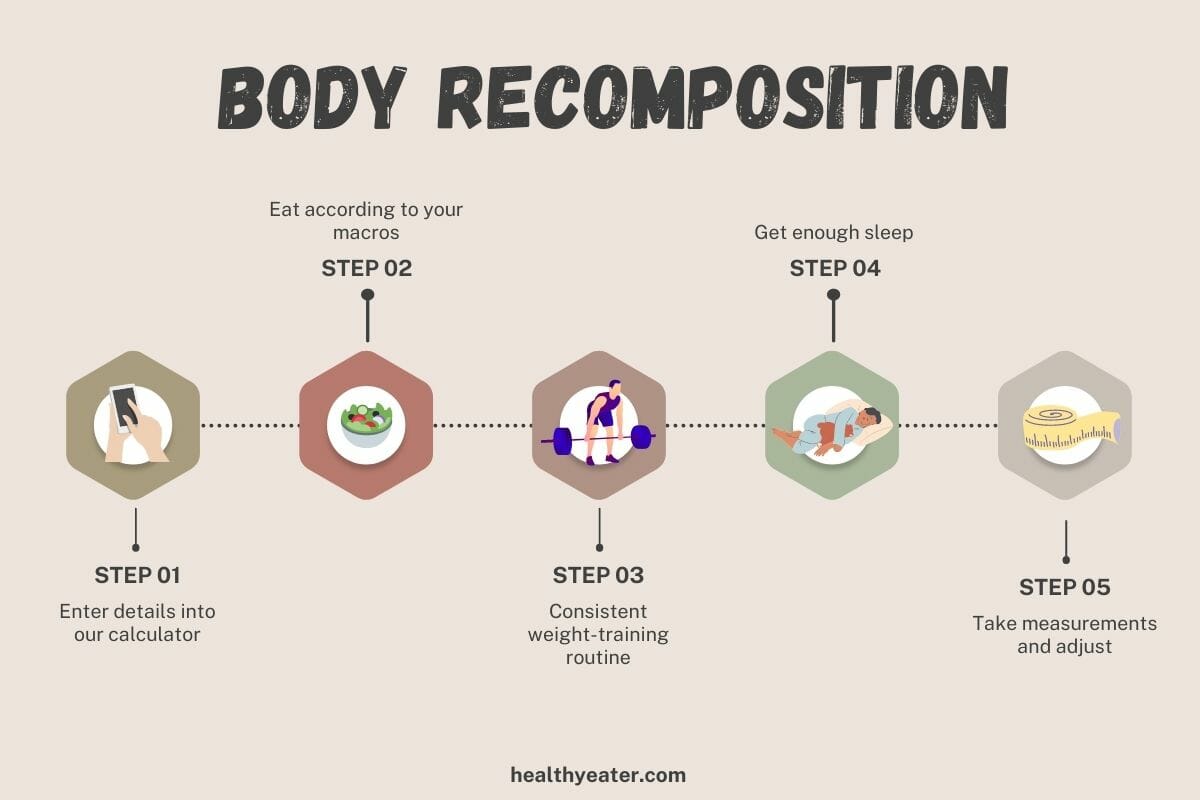
We recommend a minimum of 8 weeks.
Take measurements (fat skinfold tests, photos, etc.) weekly. You can weigh yourself – but that won’t tell you anything about your body composition.
Depending on your results, you will want to adjust your settings.
If you need help, Coach Ted has helped hundreds achieve their goals.
How much protein should I choose?
- The default option (high) is best.
- Maximum is only for those doing longer, more intense weight-lifting workouts.
- Plant-based protein is set lower: It’s challenging to meet the protein macro without carbs and fats getting too high. If you are vegetarian or vegan and okay with 1-2 protein shakes daily, use the default option.
If I do extra workouts, do I need to account for the calories?
You can account for the extra calories if you do over three weight training sessions a week.
- Track your extra calories over a week.
- Be conservative (i.e., don’t overestimate).
- Enter them into the “Additional Weekly Calories.”
The additional energy expenditure will be allocated to the overall weekly algorithm.
If you need help, use the calorie burn calculator. Remember you are looking for extra calories expended over a week.
How many calories should I eat a day for a body recomposition?
There is no one-size-fits-all here. Calories and macros for body recomposition are highly individualized.
Your biological sex, height, weight, and activity level will predict your daily energy expenditure. By making minor adjustments to this, you can begin the process of gaining muscle while losing fat mass.
The technical bits – how to calculate calories for body recomp
- Apply the Mifflin-St Jeor equation to calculate your basal metabolic rate.
- If you know your body fat percentage, use the Katch-Mcardle formula.
- Multiply BMR by 1.2 to get your maintenance calories.
- Adjust the calorie amount for training days based on the goal:
+20 % for more muscle gain and +10% for more fat loss. - Adjust calorie amount for rest days based on the goal:
-5% for more muscle gain, -15% for more fat loss. - Calculate protein amount
The default is 0.95 grams protein/lb (~2 g / kg) of body weight. Plant-based is 0.65 g/lb. - Calculate the fat amount.
Calculate fat at 30% of daily calories. - Calculate the carb amount.
All remaining calories are allocated to carbs.
Yes 🤓. That’s why we made a calculator.
Is this the same as the macro calculator?
No, there are many differences.
The standard macro calculator is aimed at people wanting to lose weight, and exercise is optional.
There are differences in both the calorie calculation step and the macro calculation step.
How much cardio for a body recomposition?
The traditional bodybuilding method involves a ‘bulk’ phase (lots of calories + heavy weights), followed by a ‘cutting’ phase (reduced calories + lots of cardio).
Body recomposition is a different process. Cardio alone (such as steady-state running or walking for 20 mins+) won’t increase muscle mass.
You should keep cardio to a minimum. However, it’s good for the heart and mental health, so don’t give up going for bike rides or walks if this is your thing.
It’s a good idea to account for the extra energy expenditure from cardio.
If you burn a lot of calories through cardio, you will not achieve the desired body recomp results. You are not doing a body recomposition!
Help! I’m not getting the desired results
- “I’m gaining some muscle but not losing fat“
Adjust calories down lower. - If your goal is Even, change it to More Fat Loss.
- Are you eating more on workout days? And less on non-workout days?
Sources
- Barakat, C., Pearson, J., Escalante, G., Campbell, B., & De Souza, E. O. (2020). Body recomposition: can trained individuals build muscle and lose fat at the same time?. Strength & Conditioning Journal, 42(5), 7-21. (full text)
- Ribeiro, A. S., Pereira, L. C., Schoenfeld, B. J., Nunes, J. P., Kassiano, W., Nabuco, H. C., ... & Cyrino, E. S. (2022). Moderate and Higher Protein Intakes Promote Superior Body Recomposition in Older Women Performing Resistance Training. Medicine and science in sports and exercise.Link
297 Comments


 Menopause Macro Calculator
Menopause Macro Calculator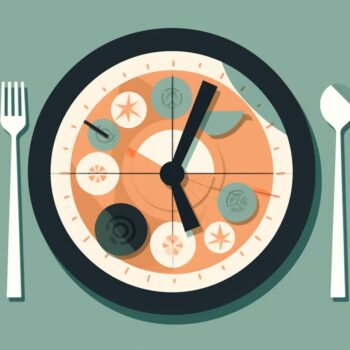 Intermittent Fasting Calculator
Intermittent Fasting Calculator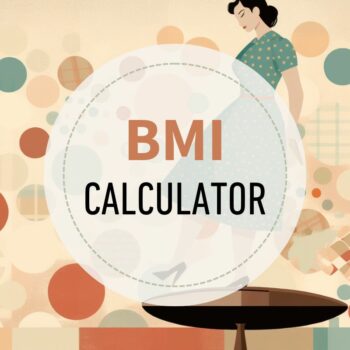 BMI Calculator
BMI Calculator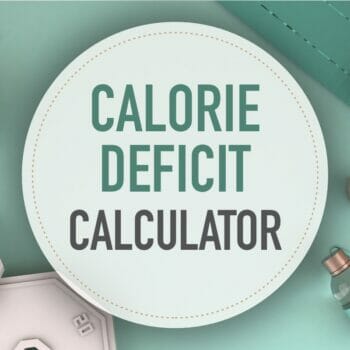 Calorie Deficit Calculator
Calorie Deficit Calculator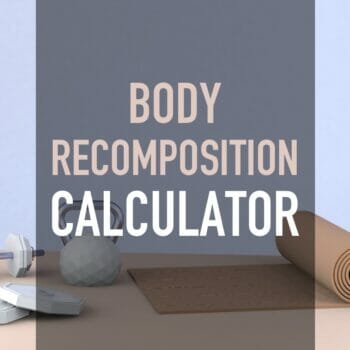 Body Recomposition Calculator
Body Recomposition Calculator
hello, i’m ana and i’m 17 years old. i’m a karate athlete (high level) and i do 3 max 4 workouts of karate per week — i consider it a cardio.
however, i want to gain some muscle but still lose some fat on my stomach area, and keep my weight. should i do a body recomp?
thank you
Hi Ana, I think that would be a good idea based on your goals. Set it at more fat loss to start.
Hello, I am 26 year old female, currently at 135lbs. I want to gain muscle specifically in my glutes and thighs… I’m currently at a 1200 cal deficit and would like to know how to specifically gain muscle and fat in my glute and thigh area and not anywhere else? Thank you!
Hi Leslie, Thanks for visiting. You can gain muscle in your thighs and glutes but you can’t add fat there specifically without adding fat other places as well. If you want to add muscle you’ll have to be eating more and then focus on the right weight training movements that focus on those muscle groups.
Hi Ted, I’m completely new to resistance training and I heard that body recomp would be a great option for me as a beginner. Do you have any advice on what to look out for during starting the nutritional side with a history of restrictive eating disorders, as I’m going from around 90gs of protein to 204gs daily? Thanks in advance:)
Hey Eszti, I think first of all don’t get too focused on perfection but see the numbers as guidelines not musts. Secondly set realistic goals. 204 grams seems a bit high to me. If you have a bit of fat tissue to lose then this weight shouldn’t be considered in the protein calc. If you have 15+ pounds of fat to lose you’d want to start with a deficit of 20%. I’m more than happy to help you dial in those initial calculations here: Expert Macro Calculations
Hello, I’ve put on some muscle and lost some fat over the last few months but I’m looking for a bigger change. I’m currently at 245 lbs and 45% body fat, should my main focus be losing the weight first although that may include muscle loss?
Hi Chanel, I’d recommend a slightly larger deficit of about 15-20% to skew more towards fat loss since you are at 45%. Otherwise, it will take too long. If you keep up with your strength training and make sure you’re getting adequate protein, you should still be able to see some small muscle gains too.
Silly question I’d imagine. I track my calories on an app which allows you to input the calories you’ve burnt through exercise as well. If I’m on a training day and your calculator says I need 2279 calories and I burn 333 calories through training, do I need to make up those calories I’ve burnt? Or do I aim for 2279 and that’s it?
Hey Lee, No worries, I’m always happy to help. If you’re tracking your exercise and adding it to your nutrition via your app then you need to use your rest day numbers in the app. That way your app will adjust accordingly based on the exercise you do on a given day. Does that help?
I’m currently 5’9 195 lbs at 17%bf. Is it okay for me to do a body recomp or should I do a regular cut first?
Hi Leon, I would recommend a 20% deficit. This will help you lose the fat quicker but you shouldn’t lose any muscle at this level. See my Macro Calculator for this.
Hi, Can I maintain an average daily calorie intake of 1528 consistently throughout the week instead of consuming 1700 calories on training days(4)and 1300 calories on non-training days(3)?
Is it bad to have the same calorie intake every day or should it vary?
Hi Aline, It’s better to eat according to your energy needs on a given day because this is one of the keys to maintaining a healthy weight once you reach your goals. In this scenario, 3 days out of the week you’d likely not be in a calorie deficit to burn fat and then 4 days a week your deficit would likely be too big to build muscle.
Hi Ted, currently, I have five training days each week, with three days dedicated to lower body exercises and two days focused on upper body exercises. I’m considering following this recomposition nutrition plan, where I eat as if all five days are training days (in a caloric surplus), and only have two days for resting. However, I’m worried that following this approach might result in fat gain since I would only be in a calorie deficit for two days. Can you provide some guidance or advice on this matter?
Hi Dia, Thanks for the question. If you have some fat to lose at the same time as building muscle, it’s a good idea to be in at least a slight deficit throughout the whole week. Otherwise you do risk fat gain or the inability to get any leaner. I’m happy to help you with your numbers if you need some expert calculations. Expert Macro Calculations
Sorry Ted, I called you Scott below as I was looking at the previous comment.
Hi Scott, I noticed that you use 1.2 TDEE shows “Sedentary Lifestyle, Little or No Exercise, Moderate Walking, Desk Job (Away from Home) (1.2).” So this is what we would use considering not including our 3 X lifting and walking etc? I have been trying to figure out my calories for body recomp. I am post menopause 57, 5’7 131lbs, started heavier strength training a few months ago. I see tiny improvements in my body, but still soft in my lower body. I have been getting an average of about 1500 per day. Your calculator puts me at 1674 lift days and 1310 which averages to 1466 which is pretty close, is it just my age that is making this so slow? Also, I am getting about 130g or more protein daily, but I do eat low carb because I am very carb reactive so it sets me off into cravings and hunger. Thanks for any input Robyn
Hi Robyn, Yes that’s correct. Sedentary is not including your lifting day, but if you do a lot of walking it should be considered. Menopause definitely slows things down a bit but you can still get great results. I do think your calories and macros should be adjusted either with my calculator or I can do the calculations for you and consider a lot of other factors. Here’s the form: Expert Body Recomp Calculations
does being type II diabetic change my macros?
Hi Scott, typically for diabetics keeping your carbs between 30-40% is recommended, and of course, choosing carbs from whole food sources opposed to refined ones.
Hi what is considered even? I would still lose fat and gain muscle? I am fat slim 130lbs 5’4 . Its the inbetween of knowing lose fat thats covering my abs or start gaining muscle. I work out 3x a week only strength use to do alot of cardio till i learned thats a no no
thanks
Hi Chris, This means that your weight will stay about the same since the mucsle gain will cancel out any fat loss on the scale. You may want to start out skewed more towards fat loss until you can see those abs.